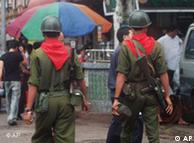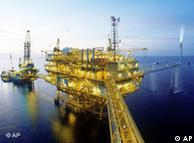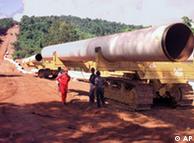Energy | 02.03.2010
Controversy over Myanmar-China pipeline
80 percent of China's oil currently goes through the narrow Strait of Malacca, passing Malaysia and Indonesia, a strategically vulnerable zone with a history of piracy. So China's ambition to use Myanmar's strategic access to the Indian Ocean and avoid the strait will not only be a money-saving short cut.
Concerns for human rights
However, rights organizations are concerned that there will be human rights violations. Many fear this pipeline project could turn into a sequel to the Yadana gas pipeline, a project connecting  Bildunterschrift: Großansicht des Bildes mit der Bildunterschrift: Soldiers in Myanmar have been known to abuse human rightsMyanmar and Thailand, which resulted in countless cases of rape, murder, forced labor and a large out-of-court settlement in 2004 between US energy giant Unocal and Burmese plaintiffs.
Bildunterschrift: Großansicht des Bildes mit der Bildunterschrift: Soldiers in Myanmar have been known to abuse human rightsMyanmar and Thailand, which resulted in countless cases of rape, murder, forced labor and a large out-of-court settlement in 2004 between US energy giant Unocal and Burmese plaintiffs.
Wong Aung, coordinator of the Shwe Gas Movement, which is speaking out loudly against the construction of the pipelines, says the estimated 29 billion dollars the Burmese government is expected to gain out of these pipelines annually will be used to further suppress the Burmese people. "The beneficiaries of these pipeline projects have used this revenue to institutionalize the military and recruit Chinese soldiers to come here and oppress the local people. And we believe the local people are being forced to work on this pipeline as well."
Bernt Berger, a German expert on Myanmar, says forced labor is very likely to play a role in the construction of the pipelines, "this is a legitimate concern because it has been the practice over many Bildunterschrift: Großansicht des Bildes mit der Bildunterschrift: Unocal pipeline, Southeast Asia. Burmese democracy groups and rebels voiced opposition towards the pipeline saying it will provide cash for Myanmar's military regime years and I think there's no reason to believe that they won't do it in this case."
Bildunterschrift: Großansicht des Bildes mit der Bildunterschrift: Unocal pipeline, Southeast Asia. Burmese democracy groups and rebels voiced opposition towards the pipeline saying it will provide cash for Myanmar's military regime years and I think there's no reason to believe that they won't do it in this case."
Forced labor, land confiscations, no compensation
The military regime has already confiscated vast areas of land along the pipeline and given no compensation. And many feel China is to blame. But "China usually does not interfere into processes inside countries. That means they would not provide any help to the population because they would think that is the job of the Burmese government," says Berger.
Berger believes that this approach has created some resentment among the population of Myanmar, where for decades, China has been the main foreign investor.  Bildunterschrift: Großansicht des Bildes mit der Bildunterschrift: Demonstrators in Los Angeles in 2004, hoping to persuade Unocal to leave Myanmar, where it was accused of profiting from human rights abuses during a pipeline project.
Bildunterschrift: Großansicht des Bildes mit der Bildunterschrift: Demonstrators in Los Angeles in 2004, hoping to persuade Unocal to leave Myanmar, where it was accused of profiting from human rights abuses during a pipeline project.
"I think what is generally happening is a negative attitude towards Chinese investors and Chinese business people who come to Burma but I don't think in that region that there will be any unrest. The area where unrest happens are more in the border areas among minorities and that is a big issue this year, where the elections are coming up."
In August 2009, when over 30,000 Burmese belonging to an ethnic Chinese minority fled Myanmar to China after a military offensive against rebels in the area, Beijing became quite unfriendly towards its ally - which goes to show that China's policy of non-interference in Myanmar has its limits.
Author: Sarah Berning
Editor: Grahame Lucas

沒有留言:
張貼留言